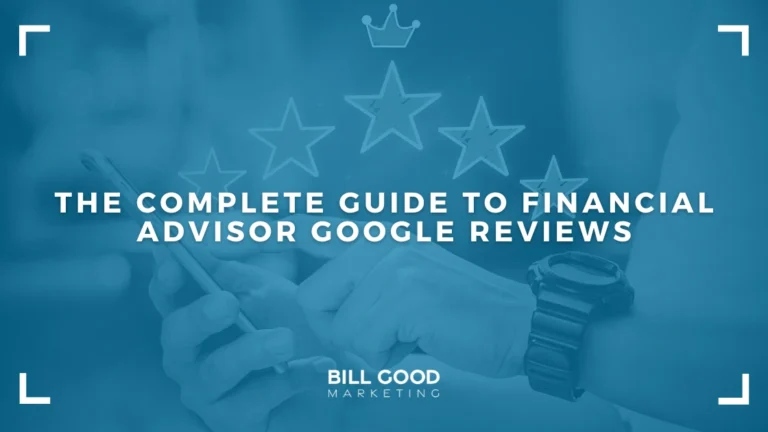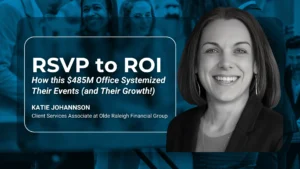If you set things up correctly, referrals can come from a variety of sources, like Sunday barbecues, golf foursomes, and even handwritten thank-you notes. You serve your clients well, and when a friend, neighbor, or family member need financial advice, your name gets passed along—quietly but powerfully.
That’s happening for many advisors. But these days, it can also start with a Google search.
- “Best financial advisor near me.”
- “Top-rated wealth management firm in [City].”
- “CFP with good reviews.”
And what shows up?
Google reviews.
Before a prospect ever visits your website, hears about your credentials, or shakes your hand, they’re reading what others have to say about you. Those little stars next to your name? That’s a key part to your new referral engine.
But here’s the catch: most financial advisors aren’t taking advantage of it.
According to recent data (Kitces.com), fewer than 10% of SEC-registered investment advisers are leveraging Google Business Profiles. Fewer still have a real strategy for collecting client testimonials or encouraging positive reviews. That’s a missed opportunity.
At Bill Good Marketing, we’ve spent the last 45+ years helping advisors grow through referrals, systems, and smart marketing—not gimmicks. And we believe that Google reviews, now that they are allowed under the new SEC marketing rule, are essential.
Done right, they’re:
- Free marketing
- Social proof
- An SEO booster
- And the modern version of “I’ve got a guy…”
In this article, we’re going to show you exactly how to get more reviews, stay compliant, and turn online reviews into your firm’s most powerful lead generation channel.

What the SEC and FINRA Say About Testimonials and Endorsements
For years, the compliance wall around testimonials and online endorsements kept financial advisors away from Google reviews—and understandably so. The fear of crossing a line with FINRA or the SEC kept most RIA firms, CFPs, and wealth management professionals from asking clients to share feedback publicly.
But then came the SEC’s 2021 update to the Investment Adviser Marketing Rule. And everything changed.
Here’s what you need to know:
You can ask for Google reviews.
You can share client testimonials.
You can include endorsements and star ratings in your marketing.
And yes—you can leverage those five glowing stars on your Google Business Profile.
(At least, these are the rules with the SEC. Your compliance may have more rules around these standards.)
The Big Three Definitions (and Why They Matter)
- Testimonials are statements from clients about their experience with you or your financial planning services.
- Endorsements come from non-clients—think a CPA, attorney, or financial professional in your network.
- Third-party reviews are unsolicited posts made on public platforms, like Google My Business, Yelp, or AdvisorFinder.
You can use all of them. But the moment you start cherry-picking which ones to feature, or editing the language to make them sound better, you’re creating what the SEC calls an “advertisement.” That comes with more disclosure requirements—and more compliance complexity.
What’s Safe (and Smart) to Do:
- Let clients leave reviews directly on your Google account or Google Business Profile.
- Provide the same opportunity to all clients—no cherry-picking.
- Share reviews publicly only if you follow disclosure rules (whether those are for your planning services as a CFP or investment prowess as an investment adviser).
- Include general review content on your advisor websites, webinars, and other digital marketing channels—with the right disclaimers.
What to Avoid:
- Asking only your happiest clients to leave reviews
- Writing a review on their behalf or scripting their testimonial
- Selectively displaying 5-star reviews while ignoring others
- Paying for reviews (in cash, gifts, or special favors)
At Bill Good Marketing, we believe in what we call the Trusted Advisor Identity. If you’re providing world-class financial services, you don’t need to manufacture praise—your clients are already saying great things. You just need a system that allows those words to show up where new prospects are already looking.
In short, the updated SEC rule doesn’t just allow Google reviews—it invites them.
You just need to be smart, consistent, and fair.

Compliance Do’s and Don’ts for Google Reviews
Let’s be honest—compliance can feel like walking through a minefield. Especially when it comes to something as public and permanent as Google reviews.
But here’s the truth: compliance isn’t the enemy of growth. It’s the framework that allows financial advisors, RIAs, and fee-only planning firms to scale their marketing efforts without fear of blowback.
When you understand what’s allowed—and build a repeatable system around it—you can turn online reviews into a reliable source of new clients and lead generation, all while staying inside the lines.
Let’s walk through the rules.
DO: Ask All Clients Equally
Don’t just send your Google My Business link to the clients who just hugged you after a great quarterly review. That’s called cherry-picking—and it’s exactly what the SEC is trying to prevent.
Instead: Create a rotation in your CRM. Tie review requests to service anniversaries, financial plan delivery, or ALL post-review follow-ups. That way, every client gets the same opportunity to share feedback, whether they’re a high-net-worth family member, a new client, or someone still figuring out their financial future.
DON’T: Script or Polish What They Say
It’s tempting to “help” your clients write better client testimonials—maybe by providing a template or editing out a clumsy sentence.
Don’t.
As soon as you influence the language or approve the content, it becomes your communication—not theirs. That means it’s now considered an “advertisement” and is subject to stricter rules around disclosures, performance data, and conflicts of interest.
DO: Update Your Form ADV and Policies
If your advisory firm is going to incorporate testimonials or endorsements into your digital marketing, your compliance documents need to reflect that.
Update your Form ADV (part 2A or Firm Brochure), internal Policies & Procedures, and any third-party contracts related to marketing and financial advice. This creates the paper trail regulators want to see—and gives your team the confidence to move forward.
DON’T: Ignore Negative Reviews
Nobody wants to see bad reviews. But pretending they don’t exist—or trying to get them taken down (except in extreme circumstances where the reviewer is and never was a client)—isn’t the answer.
A better approach? Respond with grace and professionalism.
Acknowledge the concern. Restate your commitment to service. And take the conversation offline.
Example: “Hi Sarah, thank you for your feedback. We’re sorry to hear about your experience. We take all feedback seriously and would appreciate the opportunity to speak with you directly to address your concerns. Please feel free to contact our office at [phone number] so we can make things right.”
Even financial professionals with the best service standards occasionally face criticism. How you handle it is what matters—and it often builds more trust than a dozen 5-star reviews.
DO: Make Reviews Part of Your Client Communication System
This is where most financial planners drop the ball.
They might ask once, awkwardly. Then never again.
But if you want a steady flow of positive reviews on your Google Business Profile, it has to be baked into your system. Just like annual reviews, client calls, or birthday letters.
At Bill Good Marketing, we recommend making reviews part of your:
- 90-day personal contact strategy
- Annual review follow-up
- Automated email sequences tied to client milestones
Bottom Line
The rules are clear. The risks are manageable. The opportunity is huge.
When you follow the do’s and don’ts above, you’re not just staying compliant—you’re building a public reputation that attracts prospective clients, impresses potential referrals, and strengthens your financial advisory brand.
And that’s the kind of search engine optimization you can’t buy.

How to Get More Positive Reviews Without Sounding Desperate
Here’s the good news: clients want to say thank you. They just need a little direction.
You don’t need to beg, bribe, or bother people to get great Google reviews. You need a simple system that fits naturally into your existing client communication strategy.
Here’s how to do it (This is not a “pick one” list. Do them all):
- Send a short, personal email after key moments (e.g., onboarding, annual reviews, financial plan delivery). Include a direct link to your Google Business Profile.
- Use clear, human language.
“If you’ve found our work together helpful, we’d be honored if you shared a quick review.” - Add a “Leave us a review” button to your advisor website, email signature, and LinkedIn profile.
- Create a recurring reminder in your CRM—tie it to anniversaries, service tiers, or campaign follow-ups.
No awkwardness. No pressure. Just consistency.
What Makes Clients Leave 5-Star Reviews
You want more positive reviews on your Google Business Profile—but how do you get clients to write something meaningful?
Here’s the truth: clients aren’t writing about performance—they’re writing about how you made them feel.
When we analyzed hundreds of Google reviews for financial advisors across the country, a pattern emerged. The best reviews didn’t mention beating the market. They didn’t rave about tax-loss harvesting or portfolio alpha.
They said things like:
- “They listened to me when no one else did.”
- “They helped me create a plan for my kids and grandkids.”
- “They gave me confidence when I was scared.”
- “I trust them with everything.”
- “They explained my retirement options better than any other advisor.”
In other words, the best client testimonials come from emotional clarity, not financial complexity.
So, what actually triggers a 5-star review?
Let’s break it down.
1. Personalized Planning
Generic advice doesn’t generate loyalty. When a client feels like their financial plan was built just for them, they’re far more likely to leave a glowing review.
“They built a strategy that fits my business, my family, and my future.”
This is why so many successful wealth management firms emphasize values-based planning—it deepens trust and creates that “you get me” feeling.
2. Clear Communication
Clients don’t expect you to simplify the market. But they do expect you to simplify their experience.
That means:
- No jargon.
- No talking over them.
- And plenty of clear, visual explanations of what’s happening and why.
“I finally understand where my money’s going and how it works.”
Your communication style is a major differentiator—and one of the most commonly cited reasons in top financial adviser Google reviews.
3. Being Present in the Moments That Matter
The best advisors don’t just check in during Q4 reviews. They show up during:
- Life transitions
- Market volatility
- Birthdays, anniversaries, sickness, bereavement, and other life events
- Business sales or wind-downs
- Difficult decisions about aging parents or family members
“They called me the day after my father passed just to check in. That meant everything.”
These moments become memories. And those memories turn into 5-star reviews that prospective clients actually care about.
4. Trust-Building Systems
You don’t have to guess at what creates trust. You just need a repeatable system that puts you in the right place at the right time—over and over again.
If you’re using our 90-day contact strategy, you’re already:
- Staying in touch
- Profiling client needs
- Reinforcing value
- And creating consistent touchpoints that feel personalized
This doesn’t just earn referrals. It earns reviews. The Google reviews that convert searchers into new clients—and strangers into potential clients.
Bottom line?
The best financial advisor reviews come from genuine emotional impact, not slick marketing.
If you want online reviews that stand out in Google search, get shared on LinkedIn, or help you dominate local search rankings, you need to build more review-worthy moments into your business.
That starts with:
- Personalized financial advice
- Clear communication
- Consistent, thoughtful service
- And a system that reinforces all three

How to Handle Negative Reviews (and Prevent Them)
No one likes getting a bad review. But in today’s world of Google searches and online reviews, it’s bound to happen—even to great financial advisers.
The key isn’t to avoid them entirely. It’s to prevent what you can and respond wisely to what you can’t.
Preventing negative reviews:
- Set clear expectations early. If a prospective client doesn’t meet your ideal client standard, say so upfront—and refer them to another financial professional who might be a better fit.
- Train your team. Every touchpoint matters—especially with people who don’t become clients.
- Treat every exit with dignity. How you part ways often determines whether someone walks away quietly or leaves a 1-star rant.
Responding to bad reviews:
- Stay calm.
- Don’t get into specifics.
- Be respectful.
- Invite them to continue the conversation offline (include your phone number).
- Show empathy—and professionalism.
A thoughtful response can do more for your firm’s name than a dozen positive reviews.

Why Google Reviews Help Your SEO and Attract More Financial Planning Clients
You already know Google reviews build trust.
But here’s what most financial advisers miss: They also help you rank higher in Google—where prospects are already searching.
Whether someone types in SEO keyword phrases like:
- “financial planner near me”
- “wealth management firms in [city]”
- Or even your firm’s name…
Your Google Business Profile is often the first thing they see. And reviews—specifically, the quantity, quality, and recency of them—are a ranking factor for local search.
Why that matters:
- More online reviews = stronger local business presence
- Higher star ratings = more clicks, calls, and appointments
- Keywords inside reviews = better search engine optimization
- A consistent stream of reviews = signals Google you’re active and relevant
In short, Google reviews don’t just help your marketing efforts—they’re a direct line to more new clients.
Related: SEO Tips Every Financial Advisor Must Know

Build Trust at Scale with Bill Good Marketing
You’ve spent years earning trust, delivering results, and guiding clients through the most important financial decisions of their lives.
Now it’s time to let the world see it.
Google reviews aren’t just about SEO or online visibility. They’re about giving prospective clients a glimpse of what it’s like to work with you—through the words of those you’ve already helped.
And thanks to the SEC’s updated marketing rule, you’re finally allowed to share that story.
Done right, reviews become:
- Evergreen referrals
- Scalable social proof
- A core piece of your digital marketing system
- A major factor in driving new clients through Google search
But it won’t happen by accident. You need a process that’s thoughtful, compliant, and consistent—a system that helps you collect the client testimonials you’ve already earned.
At Bill Good Marketing, we’ve helped thousands of financial advisers, wealth management firms, and financial professionals build the kind of business that earns reviews automatically—because it earns trust at every step.
If you want help putting that system in place, you know where to find us.
Let’s turn the trust you’ve earned into growth you can measure.
About the Author

Andrew D. White is the Director of Marketing at Bill Good Marketing and part of the team behind Altitude, the AI-native CRM built exclusively for financial advisors. He develops marketing strategies that strengthen client relationships, accelerate asset growth, and reduce time spent in the office. With hands-on experience working alongside top advisors, Andrew focuses on proven systems that elevate prospecting, branding, and practice management into predictable growth engines.





